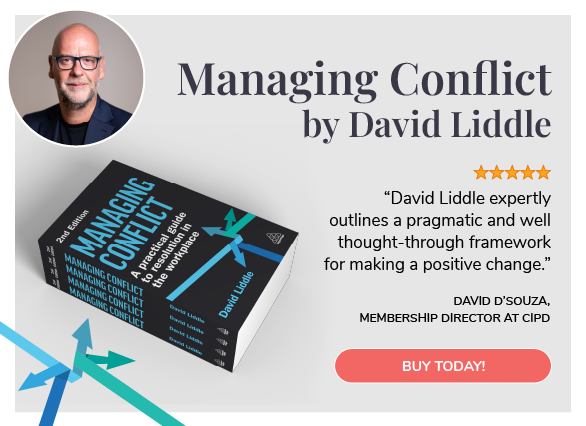
Share article:
Tags:
There’s a huge contradiction at the heart of most workplaces. It attacks productivity, saps morale and leaves everyone – and the bottom line – worse off. And it’s perfectly highlighted by the results of a survey we recently carried out here at TCM.
When we asked our customers and contacts who was responsible for dealing with conflict in their organisation, 86% said that managers were.
But when we asked respondents whether they’d ever had any specific training in dealing with conflict an astonishing 48% said they hadn’t. A further 33% said it had been more than a year since their last training.
That, in a nutshell, is the problem we face, the circle we are often struggling to square. We expect our managers to deal with conflict but all too often we don’t equip them with the skills they need to do it.
Managers and leaders are busy people. They often have endless tasks competing for their attention. If they don’t feel equipped to tackle conflict it is not surprising that many just hope the situation will go away or sort itself out.
And that is why we need Leadiators.
Leadiators combine the skills of leadership and mediation to help our workplaces handle difficult conversations.
When you look at the leader and mediator roles, they already have much in common and their skills often overlap.
Leadership
Many workplace conflicts involve leadership challenges. In the majority of workplace conflicts at least one party in the mediation process is a leader, manager, supervisor or team leader.
Even when one of the parties in the mediation is not a manager, often management or leadership style is mentioned at some point during the mediation process.
It is important that leaders are aware of their management or leadership style, as well as the other styles they have available to them, so they can adapt to the situation and people they are leading.
Leadiators can help other managers who are not so aware and adaptive to dealing with conflict to be more mindful when leading or managing their teams.
Communication
<br/
Leaders are expected to communicate difficult messages, sometimes in difficult situations. Mediation training allows managers and leaders to handle challenging scenarios professionally with empathy, diplomacy, discretion and clarity. The same expectations are placed on a skilled and trained mediator.
Communication often underpins all conflict in the form of miscommunication, lack of communication or misunderstanding of what was said.
Differences in communication style can also lead to conflict through frustrations and misunderstandings of intent and meaning.
By being an effective communicator and active listener, Leadiators can allow others to exchange facts, feelings or impressions in a way that each gains a common understanding of the events and issues involved.
Coaching ability
Coaching is a process in which you work with someone to determine the current situation, set goals for the future and plan ways to meet these goals.
Coaching through mediation is very useful in conflict resolution. It can be used to prepare parties for mediation and assist parties to shift from narrow thinking to more broad, reflective and positive ways of thinking.
This allows parties to take in and consider more information than their initial assumptions, and thoughts, about the situation.
The goal of a good Leadiator is to increase self- and other-awareness and to increase the likelihood of behavioural change. This, in turn, increases the likelihood of effective and sustainable outcomes in the mediation process and transfers into the wider successes of the business.
Solution focus
Leadership is all about having a vision of where you want to be and working to achieve that vision.
The goal of mediation is to resolve the present conflict and ensure the relationships are ‘healed’ to some extent.
Solution-focused thinking, feeling and behaving is as important in conflict resolution as it is in strong leadership. A successful mediation process requires a high level of future-focus from individuals in order to establish clear needs, goals.
This creates a clear vision to work towards specific solution-focused requests from each other to make that vision become a reality.
Trust
You can’t be a great leader without trust.
You can have a compelling vision, rock-solid strategy, excellent communication skills, innovative insight and a skilled team, but if people don’t trust you, you will never get the results you want.
Mistrust fosters frustration, dissent and low productivity. Establishing or rebuilding trust is an essential skill for a leader and a mediator to understand the ongoing relationship where parties are part of a team or work closely together.
Leaders understand the different forms of trust and psychological contracts that can exist within an organisation. Leadiators have the required skills to assist parties to begin to rebuild that trust.
They help to ensure resolutions are workable and sustainable. Leadiators facilitate the trust-building process through managing conversations about how the parties will begin rebuilding their trust through mutual understanding of what is required, and how to ensure that the steps are carried out.
Train for success
As you can see, a good leader and a good mediator share numerous skills and qualities.
By introducing mediation training or a mediated approach to conflict resolution into your organisation, you will be demonstrating your commitment to recognising and more importantly efficiently resolving issues that arise between your employees.
This will also help to rebuild any trust which may have been lost during the turbulent times of conflict.
Watch: ‘Leadiation ’ Management Mediation Key Leadership Skills Webinar
When we asked our customers and contacts who was responsible for dealing with conflict in their organisation, 86% said that managers were.
But when we asked respondents whether they’d ever had any specific leadership training in dealing with conflict an astonishing 48% said they hadn’t. A further 33% said it had been more than a year since their last training.
There is definitely a place for managers conducting mediation…but it is vital that the managers involved have the appropriate level of mediation training.
– Sally Bright
Employment Rights Officer at Trade Union Congress
Psychological Contracts are based on, unwritten rules, perceptions and expectations between individuals, but carry huge significance to the smooth running of a work environment.









